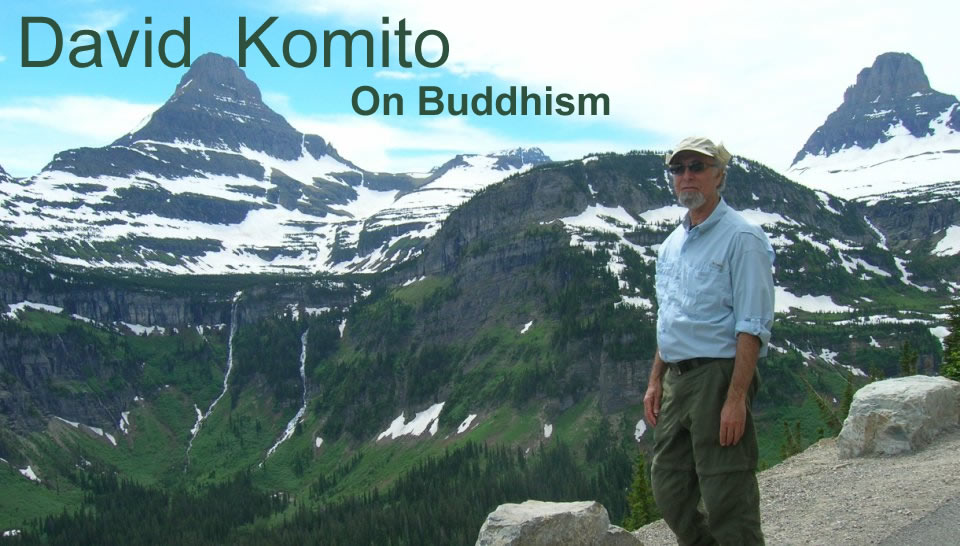I am not sure exactly what Rinpoche would be referring to in Tibetan when he says "master." The usual term is "lama," which is the Tibetan version of "guru." But he does not use the term lama. Anyway, out of curiosity I took a trip to the dictionary. It tells me a master is someone who has control over others, or is in charge of a group. But a master is also a person who is skilled at some activity, who has mastered something. I think that both these ideas might be in Rinpoche's mind, and they suggest why some Americans have difficulty with deeply learning or adopting a spiritual practice. Of course some of us do want to learn how to practice meditation or whatever activity will put us in touch with the spiritual part of ourselves. Learning from a master meditator obviously would be desirable. But what about the other meaning of master? The master may have control over the essentials of meditation practice, but will we give her/him control over us? Will we surrender to a master? Do we need to? That, I think, is the rub for Americans. Our individuality, our sense of independence (even as mythically enshrined as our "declaration of independence") stands in the way.
These days of pandemic we are aware of the dangers of excessive individuality. "Wear a face mask? It is my constitutional right not to have to" is a line we all have heard. So some of us exercise our right to independence and sicken (or kill) others in the process. The critical conundrum for Americans seems to be "can I be independent and surrender to a master (or the common good) at the same time?"
The dictionary offers other meanings of master which might help with this conundrum. As an adjective master also means main or principal; as in "master bedroom." And as a noun it also means "an original from which copies can be made." How do these ideas help? In the Vajrayana (ie, tantric) path it is said that the disciple's relationship with the lama is the key to progress. In guru-yoga, which is foundational for this path, one practices the experience that the guru/lama, the disciple and the meditational image (of a buddha) are all one, all the same. Or as the Tibetans say, "all of the same taste," which adds an important element to the idea of oneness. Obviously this practice does not suggest that the personality of the teacher and the student are the same. Rather, the fundamental consciousness of the teacher (that is, the actual emptiness -- shunyata -- aspect of consciousness) and that of the student are practiced as being the same, as being one. In this way the empty aspect of the student's consciousness is understood as a copy (or perhaps reflection) of the empty aspect of the master's consciousness. The master's realization of this empty aspect of his/her own consciousness is also the main feature or principal feature of the master that matters in spiritual life. Not the master's personality, which may be quirky, or flawed, or noble and is a transitory aspect of the master, but the quality of consciousness of the master. That is what matters and that is what the disciple wishes to copy, to become.
One surrenders to this aspect of the consciousness of the master, which actually means surrendering to that aspect of oneself because this consciousness cannot be created. It already is buried within, it is eternal, so it "neither arises (is created) nor ceases", as the Heart Sutra puts it. In this sense the master's realization of the emptiness aspect of her/his consciousness actually can not be copied but is held out as something we can see in the master though we do not yet see it in ourselves. A light which shows us our own obscured light.
That mutual light is what we really surrender to. Or not. Actually that is our choice.
And if we surrender, the problem remains of disentangling the master's personality from the empty aspect of her/his consciousness. Why would I want to surrender to a flawed personality? We all have read stories of teachers who abused their students. No teacher is perfect, but is a work in progress, perhaps a bodhisattva on the path to buddha-hood. So surrender needs to be wise, needs to avoid magical thinking, needs to see clearly and needs to avoid shirking personal responsibility for choices. This is a real difficulty if one is devoted to the teacher, but at the same time this difficult work requires us to mature our own characters in our relationship to the teacher.
Suzuki Roshi, the founding teacher of San Francisco Zen Center, once said that living in community could rub away many quirks of personality in the same way as one can clean potatoes in water by rubbing them together. While he was probably only referring to students' relationships to each other, I think his wisdom might be applied to the relation of master and disciple as well. And even if the master does not change in the relationship with the student, the student can change and grow as they get bounced about by the master.
Perhaps this type of personal growth is a secondary benefit of the relationship of master and disciple. Or perhaps it is an essential part of the relationship, an essential part of becoming a true individual who can both surrender and be independent as circumstances dictate.


No comments:
Post a Comment